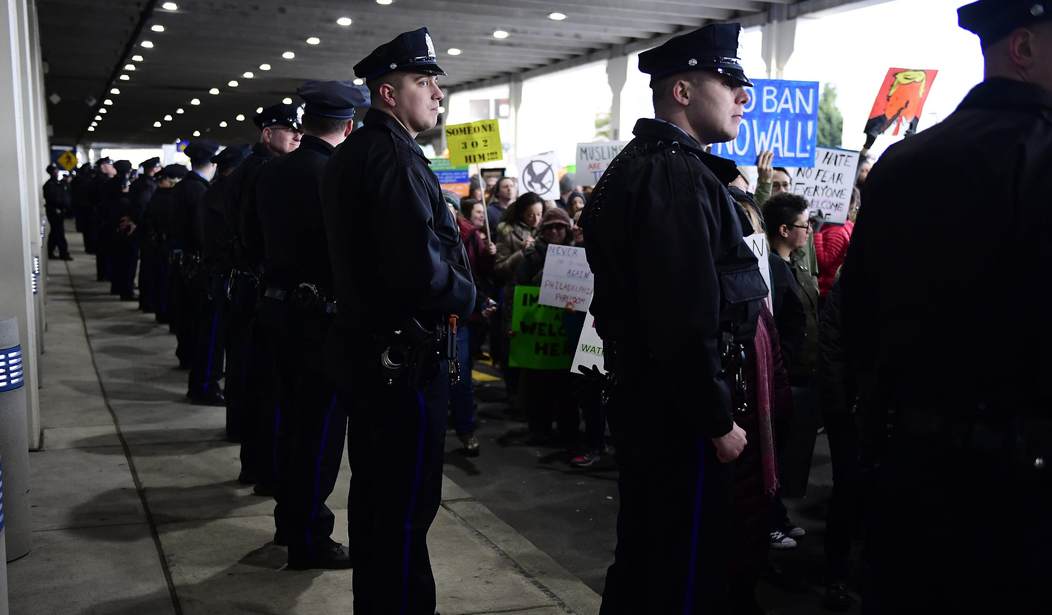Sixteen attorneys general have filed a 23-page amicus brief with the 9th Circuit Court of Appeals in support of the Washington state and Minnesota lawsuit against President Trump’s travel executive order, with New York Attorney General Eric Schneiderman calling the effort “a fundamental test” of the Constitution.
Judges today will hear arguments from the states and the Justice Department. Trump, meeting with a selection of county sheriffs at the White House today, vowed “to take it through the system.”
“It’s very important. It’s very important to the country regardless of me or whoever succeeds at a later date. I mean, we have to have security in our country,” Trump said. “…So we’ll see what happens. We have a big court case. We’re well-represented and we’re gonna see what happens.”
Asked if that meant defending his order at the Supreme Court, he replied, “I mean, we’ll see. Hopefully it doesn’t have to. It’s common sense. You know, some things are law and I’m all in favor of that. Some things are common sense. This is common sense.”
The amicus brief against Trump’s order was signed by attorneys general in California, Connecticut, Delaware, the District of Columbia, Illinois, Iowa, Maine, Maryland, Massachusetts, New Mexico, New York, Oregon, Pennsylvania, Rhode Island, Vermont, and Virginia.
“Although the amici States’ residents, institutions, industries, and economies differ in various ways, we now all stand together in facing concrete, immediate and irreparable harms from the Executive Order,” the attorneys general said.
“No president or administration is more powerful than our laws and our Constitution,” said Massachusetts Attorney General Maura Healey. “As state AGs, it is our job to hold this administration accountable and stand for the interests of our states and our residents. We are united in this effort.”
Schneiderman told MSNBC this morning that two more attorneys general are on the case; “there are other AGs that have brought cases in other contexts.”
“This is about a stay of the order. This is not an ultimate decision on the constitutionality of the overall order. This is just about the chaos that’s been created and whether the court is within its discretion to put a hold on this so that we can sort out the chaos created by the rollout of the order,” the New York AG argued.
“Two separate issues have really been raised. One, and this is what was raised by the Justice Department and their papers in opposition to our. One is, they say, we don’t have a standing. We think the law is clear that we have the standing to protect the business and other interests of our states. The second is judiciability,” he said. “And this is really troublesome. They are contending that the president is above the law, that he’s not subject to judicial review, that he is carte blanche when it comes to immigration matters. The case law is against us. He has broad powers, but he is subject to the limitations of the judiciary.”
Schneiderman says it’s “not clear” whether federal officials have been complying with the temporary restraining order issued Friday by federal district Judge James Robart.
“They say they have. But we are hearing reports — and there are cases that are being followed over the country that there are still people who are not being admitted or are — it was activities have been chilled by this order,” he said. “…I don’t want to blame DHS central, who have — Department of Homeland Security, State, truly had no notice that this was going into effect. So their folks on the ground had no guidelines. So the reports we’ve gotten are that there was inconsistent enforcement at different airports around the country. There have been dozens of cases filed on behalf of individuals who were detained or who were intimidated to signing orders waiving their right to come to the country.”
Lawyers, he said, are arguing that the order creates a “whole host of constitutional infirmities,” such as violating the right to due process under the Fifth Amendment.
“But more offensively, the establishment clause, which is the clause that says you can’t favor one religion over another,” Schneiderman added. “And I think that, for all of the rhetoric on both sides, the intent and the effect of this order is to discriminate against Muslims and to favor Christians over Muslims. And that is something that has been found constitutionally offensive.”









Join the conversation as a VIP Member